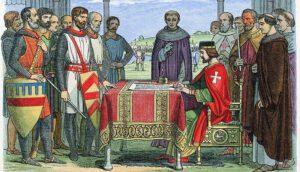The Magna Carta, Latin for Great Charter, is one of the most influential documents in history
 Magna Carta has become a foundation for many laws and political systems around the world. Signed in 1215 between King John of England and rebel barons, the Magna Carta not only established fundamental rights for everyone living within England, but it also provided a legal framework that ensured those rights were maintained.
Magna Carta has become a foundation for many laws and political systems around the world. Signed in 1215 between King John of England and rebel barons, the Magna Carta not only established fundamental rights for everyone living within England, but it also provided a legal framework that ensured those rights were maintained.
Here, we will explore how the Magna Carta helped to establish human rights, its impact on modern laws and social justice, and why it is considered so important today.
Introduction To The Magna Carta
The Magna Carta is a crucial piece of English political history that established fundamental human rights for everyone. Signed on June 15, 1215, the Magna Carta was created as an attempt to limit the absolute power of King John and recognize real protection to all his subjects – both clerics and laymen.
It has since served as a significant milestone in England’s legal system, with its four key principles still standing strong today: upholding justice, protecting basic liberties for all citizens, holding rulers accountable for their actions, and ensuring that “no one should be above the law.”
The development of such revolutionary principles set forth by the Magna Carta has been a major influence throughout Western civilization.
History Of The Magna Carta
The Magna Carta is one of the most important documents in history as it established fundamental human rights and civil liberties. In 1215, King John of England signed the Magna Carta under pressure from a group of 25 rebellious barons who were unhappy with his rule. This document laid out the concept of due process and limited the power of rulers to ensure that no individual would be above the law.
The Magna Carta was an important step forward for democracy and made sure that each person would have certain basic rights that could not be taken away by any single ruler or government system. It was also extremely influential for centuries to come, serving as a cornerstone for other documents like the United States Declaration of Independence and the Constitution.
The Legal Framework Established By The Magna Carta
The Magna Carta, signed in 1215 CE, was a landmark legal document that established fundamental human rights for everyone under the law. One of its most lasting legacies is the legal framework it created – a system of law that set out basic rules to bring order and justice to society.
The Magna Carta’s provisions prohibited arbitrary punishments or unfair taxation, promoted due process and access to justice, outlined clear standards of proof, and established limits on the power of rulers over their citizens. It was revolutionary for its time and established a firm foundation for modern constitutional governments all over the world.
Significance Of The Magna Carta In Establishing Human Rights
The Magna Carta is widely regarded as the earliest historical document that established significant human rights for all. This charter of liberties, signed by King John of England in 1215, was the first to recognize and protect certain rights for both nobility and commoners alike. The Magna Carta sought to limit the king’s absolute authority, ensuring that no one was above the law.
It declared that all free citizens had a right to justice, regardless of their social status or economic standing; this included certain freedoms of religion, assembly, movement and trial by jury. In addition, it provided protection against unfair taxation and illegal imprisonment without due process.
The legacy of the Magna Carta has been far-reaching and its importance in establishing human rights cannot be overstated – its significance continues to inspire social progress even today.
Impact On Modern Laws And Social Justice
The Magna Carta has had a lasting and powerful impact on modern laws and social justice. Its influence is evident in the emergence of early conceptions of civil liberties, due process, jury trial, habeas corpus and legal notation of the government’s responsibilities to protect citizens from arbitrary authority.
Since its signing in 1215, many countries around the world have adopted elements of the Magna Carta into their own constitutions, embodying the principles and ideals that remain relevant today. The document established a precedent for citizen representation against unchecked power and tyranny, demonstrating how everyday citizens can exercise their rights when governments need to be held accountable.
It laid the groundwork for future generations to utilize these same concepts in their pursuit of freedom and liberty.
Conclusion
In conclusion, the Magna Carta stands as one of the most important documents in history. It established fundamental human rights for people of all nationalities and social classes, laying the foundation for democracies around the world.
This charter has been a source of inspiration over centuries, reminding us that all men are created equal and have an innate right to freedom and justice.
Its revolutionary ideas continue to shape our modern lives in many ways, from having a say in how we are governed to enjoying equitable access to education and healthcare.
Copywriting was written by leading SEO Tim Wade of The WOW Adventure. If you’d like us to copywrite some compelling and engaging marketing content for you or your website, please don’t hesitate to contact us.



